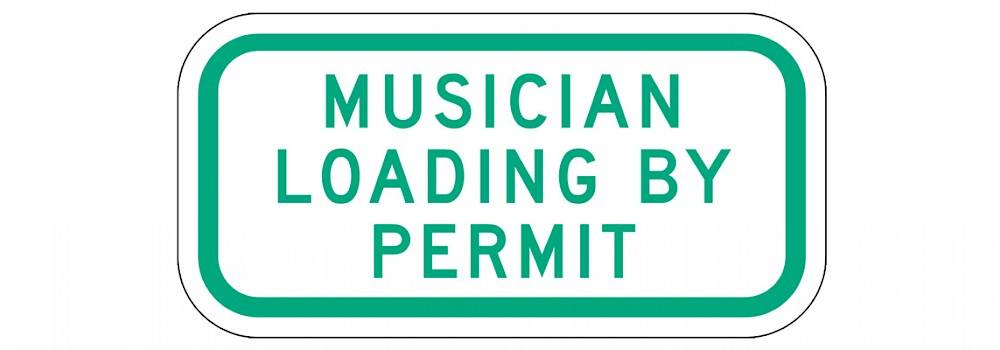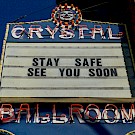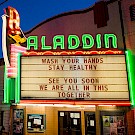In 2014, the city of Seattle rolled out priority loading zones for musicians, allowing gigging musicians to use select commercial loading zones near venues in the Emerald City. Bruce Fife of Portland’s Musicians Union, Local 99, was part of the team that helped our neighbors to the north gain this access, but when attempted in the Rose City, efforts were unsuccessful.
That didn’t change the fact that Portland musicians routinely cited inconvenience (“hauling three loads of gear 10 blocks in the rain—honestly pretty standard at this point for anything remotely near downtown”), vandalism and financial loss (“It's frustrating getting a $100-plus ticket for a $50 gig. It would have been cheaper to stay home.”)—based on 76 responses to a survey conducted by the union (and its Fair Trade Music PDX arm), MusicPortland and Vortex in October 2017. Respondents cited 48 current clubs as “difficult to park at for load-in or load-out.”
Tragically, there was also at least one death during load-out at a venue. In September 2015, Christopher Brian Chandler was struck by a car and killed on SE Stark Street while speaking with a musician who was loading gear into his van after a show. The city of Portland’s new Musician Loading Zones pilot project is dedicated to his memory.
“Our performers and live music venues provide an enormous value to our city and shouldn’t have to risk their gear, their safety or their limited income to deliver it,” says Meara McLaughlin, executive director of MusicPortland.
We at Vortex recognize music as one of our city’s biggest cultural assets, and as a board member myself of MusicPortland, a nonprofit industry advocacy association that represents the interests of the entire Portland-area music ecosystem, we are excited to see city officials show a willingness to craft music supportive policies that sustain and protect what is not just culturally valuable but also economically important to our city.
 A new Musician Loading By Permit sign outside Al's Den in SW Portland. Celebrate the pilot program's launch outside Dante’s (in a loading zone) at 1:15pm on March 15 with a performance from And And And!“Portland’s vibrant music scene and the amazing musicians that call Portland home make our city special. So, this pilot is a no-brainer,” commissioner Nick Fish states. "By making a relatively minor change, we’re not only taking strides to help musicians afford to live and work here, we are declaring that Portland’s music scene is an essential part of who we are.”
A new Musician Loading By Permit sign outside Al's Den in SW Portland. Celebrate the pilot program's launch outside Dante’s (in a loading zone) at 1:15pm on March 15 with a performance from And And And!“Portland’s vibrant music scene and the amazing musicians that call Portland home make our city special. So, this pilot is a no-brainer,” commissioner Nick Fish states. "By making a relatively minor change, we’re not only taking strides to help musicians afford to live and work here, we are declaring that Portland’s music scene is an essential part of who we are.”
Recognizing the hardships that working musicians (and artists of all stripes) face in our evolving city, this Musician Loading Zones program offers our community easier, safer and more affordable access to some of the most problematic venues in SW and NW Portland—including Dante’s, Arlene Schnitzer Concert Hall, Portland Center Stage, Kelly’s Olympian, Al’s Den, Jack London Revue and Star Theater—as well as locales across the river like The Liquor Store and Mississippi Pizza.
To get a free permit decal (which is removable because it must be placed on the curbside windshield when using designated loading zones), local musicians need simply apply at:
PDXMUSICLOADING.COM
Decals can then be mailed or picked up at the union or any MusicPortland first Monday meetup—next one on Monday, April 1 at the Alberta Street Pub.
And to quell any musician concerns about this parking permit decal being an invitation for larceny, it is removable—because, again, it must be placed on the curbside lower corner of your front windshield when in use, which, depending on what side of the downtown one-way street you’re on, you may have to move it. And it can then also easily be removed when it’s not in use.
Read the rest of the usage guidelines here, and remember that successful implementation and usage of this pilot program will hopefully lead to an expansion in subsequent years.
"As the arts commissioner, the transportation commissioner, and a lifelong arts enthusiast, I'm pleased to see our city address one of the unique needs and challenges of the music community—loading equipment in and out of performance venues,” commissioner Chloe Eudaly says. “Our Musician Loading Zone pilot program is an innovative project that I hope will serve as a model for other cities.”
It is also a program that puts power in the hands of independent musicians—rather than burdens venues—enabling individuals in our vibrant and diverse music community to take control of their own professional careers. Fair Trade Music PDX's Fife sums it up: “The excitement and appreciation already expressed by musicians makes it clear that we have all made the lives of working musicians just a little bit easier.”







